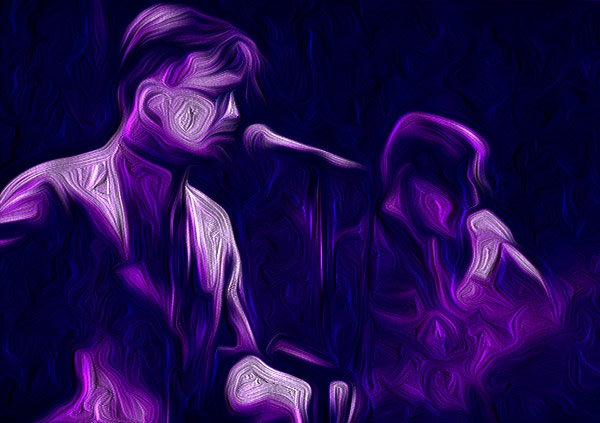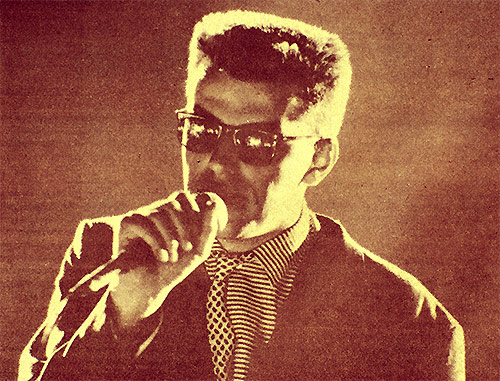
| Search JoyZine with Google Site Search! |
|
Madness interview by Joy Williams
I first became a Madness fan through their videos. Along with their intriguing ska beat, the visuals projected such a strong sense of their culture. The band members—Graham 'Suggs' McPherson, vocals; Carl Smyth, vocals and trumpet; Mike Barson, keyboards; Mark Bedford, bass; C.J. Foreman, guitars; Lee Thompson, saxes; and D.M. "Woody" Woodgate—appeared to be good, fun-loving working class-English lads. I soon learned that they were one of the biggest of all English bands—bigger than The Police in England. They had risen almost instantly, staying on the charts for ten weeks with their first single, and reaching #7 with their debut album. Five months later, their second LP reached #2. For the next five years Madness zoomed madly about the world, recording and touring almost incessantly. When I first chatted with them, it was backstage at last August's Day on the Green No. 3 (aka "The Police Show"), and they'd flow in, driven to the concert, done soundcheck, hung around until time to get ready for the stage, done the show, packed up, and flown back home to England. Just a normal 8-hour day. I saw them again some six months later when they'd decided to book five gigs on the West Coast around some other business they had here. This time, it was at The Kabuki Theatre, headlining a disappointing show. They seemed tired, different... Of course, they'd just lost founding member Mike Barson, who'd retired from the band and moved to Holland to live with his new wife. Paul Carrick, ex of Ace/Roxy Music/Squeeze filled in on keyboards on the road, but obviously, something was really affecting them negatively. The zany, nutty madness of Madness has dissipated, they're in transition as a band and as individuals. The music is more sophisticated but the new image hasn't really emerged yet. The next day I met with some of the band at their hotel in San Francisco. Mark, a kindly, down-to-earth young Englishman arrived first. Later, Carl, who always seemed to have a bemused look on his face, and Woody, a wiry, bouncy, talkative artist joined us for a talk about Madness: Past, Present and Future. Q: Your bio talks about all the records you sold, but it doesn't say who you are. How did you get together? How did you get started? MARK: Three of the members started the group, Chris and Lee and Mike. They had been going around seeing groups in pubs since they were 15, and they just thought it would be a fun thing to do. We made tapes of ourselves. It wasn't an elaborate kind of recording studio tape. It was on a 2-track machine. We took them to clubs around London to get gigs. The thing is, if you play in pubs in London the owner is not bothered about the kind of music you play as long as you bring in a lot of people to drink. And we told them, "Oh, we have lots of friends." At first, about half the audience was friends, I think. Q: How is the record industry different over there? MARK: Well, it's more accessible. When we started, we were able to go directly to the people who would help us. It wasn't like you go this week to see somebody on the 5th floor and next week somebody on the 7th floor and so on. We went straight to a man who guaranteed us a lot of things, and we said, "Fine," and that was it. You can actually go to the top man in the company or someone who will give you support, and you're not so lost in a maze of like 200 bands on a label. There are a lot of smaller labels [in England]. Q: I listened to an interview with Andy Summers of the Police one night and the interviewer asked, "Why do you think it is that The Police are so much more popular worldwide than Madness, who is so big in England?" And he said, "Well, it's because Madness is so English." MARK: It's so easy to say that we're very English. Maybe we are, but we're pulling away from that a bit now. When we first started, the things we wrote about were very personal. We wrote about where we lived and what we did. Now, it's getting a bit more general. Bigger subject, more general subject—like politics and so on. Q: I like the new stuff the best... MARK: So do I. I think it's sounding much stronger. Q: And a little more complex musically. Is that part of your "broadening?"
MARK: Yeah. Well, we're four or five years up the road. We're still going forward, trying to push forward... I like feeling happy at the end of the day, knowing that you've pushed yourself a bit. Q: What do you guys do with yourselves besides tour? MARK: We don't tour very much at all, actually. We've cut that down quite a bit. You know, you can only play live so many times. It gets boring, especially in England, where they've seen this band for 5 years. I live right in the center of London, as does all the band. As to why we cut down touring, [it's primarily] because a lot of the band members have families now. Q: It's a business that kind of takes over your life... MARK: Yeah, it's an expensive hobby. (laughs) [Carl and Woody enter the room.] Q: Did you just chance into the band also? Or was it some driving ambition? How did you happen to become a musician? CARL: It wasn't really a driving ambition. I think I just felt happy in the band. WOODY: It isn't really a driving ambition until you start coming close to making records. And then you actually start making records. Q: And then it becomes real? WOODY: Right. And then you start feeling like a band. Q: You still have this fun thing about your band. Your T-shirt for instance: "Fuck Art, Let's Dance." WOODY: That's really left over from before. It kind of reflected our style and pace and energy from when we first started. Q: We were just talking about your change of direction, musically. I liked the new stuff last night. Do you really feel you're developing a new direction? CARL: We develop individually, and then as a group it comes through. But we don't sit down and say, "Well, this year we'll go in this direction or that one," because we all write and it's too diverse a group... We don't do anything at breakneck speed anymore. Q: What are your plans for the future? MARK: To live longer, prosper, and bring world peace back to the world. Q: Good! How are you going to do that? MARK: I don't know. Keep playing, make records... CARL: We just bought a studio in London so we'll be doing more of that [making records]. We're doing a few projects without labels. We're going to bring in a lot of people and do different things. Q: I have the impression that over in England there's a tighter network of musicians of different styles than there is over here. CARL: That's probably because everything is closer in London. Q: Is there some place in the world you haven't been where you really want to go? WOODY: Yeah, China—Beijing. CARL: I think we might try doing that. Love to see China. The difference between... WOODY: They're totally different. They have totally different values. Very moral. Q: What do you think of the States? CARL: We like New York. We prefer San Francisco to L.A.... WOODY: Yes, definitely! MARK: You have to, really. Q: Of course, we know we're better (laughter)... Are you one of the married ones? CARL: Sort of. I've had the same girlfriend for five years. Common-law. Q: That can cause real stress in the band when you go from being a bunch of guys... CARL: Well, actually, I think that kind of brings everybody together more. It's different when you go back after a show to the dressing room and they're going, "Keep quiet, the baby's asleep..." It's good. It's very nice. There are a lot of bands that started up around the same time—Ebn Ozn, Haircut 100, The [English] Beat. A lot of them haven't made it. It was very hard for us to survive. Q: What is it that has allowed you to make it through this watershed period while other bands have fallen by the wayside? CARL: I don't know. Maybe it's because there is no need for anyone to be an upfront person. It's sure different from other bands where one person writes and the others just do the music. That must be a bit weird, you know. Q: You're all in it together... CARL: Yeah, we don't do anything that we feel we really have to. We do what we want to do. That means we don't do anything that gets anybody pissed off, that's all. Q: You'd have to have pretty similar ideas of what you want. WOODY: I think that's the thing. We have got a lot of common interests. We never really chased success. Q: It's interesting that you didn't set out with an "OK, this is the market we're going to go after" attitude. You just got together and did what you thought was right, yes? WOODY: Well, when we first started, we just did what we could actually do. We couldn't do much. Q: What did you do formerly that you hated so much? WOODY: (pointing at Mark): He's a brain surgeon, actually... MARK: It's true, yes... (laughter) WOODY: Actually, I really left art college to go to be a graphic artist. I got that job to pay off my drum kit. Q: So you did want to be a musician! It didn't just happen. WOODY: No, it was something to do. So I saved up for my drum kit. I was bored. Actually, after I had enough money for the drum kit, I quit. But since I left the job, I've gotten into it [graphic arts] by myself. Q: That's because you didn't have to do it for somebody else. WOODY: Exactly. The reason I saved up for the drum kit was, I always wanted the drum kit because I am a drummer of sorts. I played in two bands. I bumped into Mark a few times because I was going to school as well. The reason I started playing drums in the first place was because my brother was such a good musician. Q: What's so different about this from "The Arts." CARL: It's just a different form of expression. WOODY: Yeah. And that's the new Madness, a different form of expression, a different emphasis, a different beat—reflected in their movement away from ska. They're evolving, finding a new place in the world. They've survived the weeding out process; they've survived as a band. And, I suspect, next time we'll see a new energy from this bunch of not quite as zany guys. |

